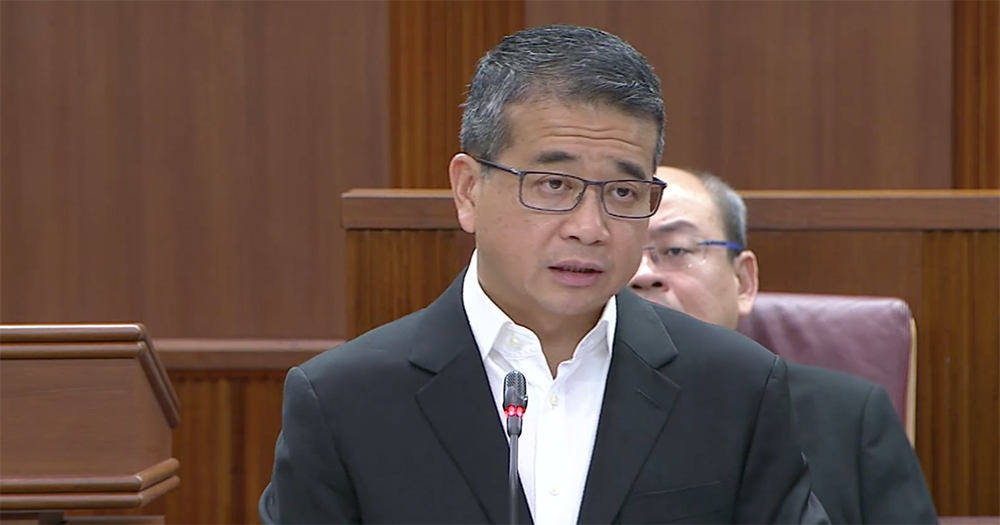The Protection from Harassment Act (POHA) will be enhanced with the establishment of a new court dedicated to dealing with harassment, the Protection from Harassment Court (PHC).
This was the announcement made by Senior Minister of State for Law Edwin Tong, at the second reading of the Protection from Harassment (Amendment) Bill in Parliament, on May 7.
In explaining the rationale behind the Bill, Tong stated that its aim was to empower people on the street by allowing them to take back the truth, and reclaim their dignity.
Moreover, the establishment of the PHC would also address issues with the current legislation for victims of harassment such as:
Multiple processes of differing efficiency which can be confusing and distressing for victims
Tong pointed out that the current process of applying for a protection order (PO) cost between S$300 to S$500, whereas it was easier and cheaper to apply for a personal protection order (PPO) under the Women's Charter.
Additionally, victims who had chosen to file a Magistrate's Complaint instead would not have the benefit of protection afforded by a PO.
Rather, the victim would have to apply for a PO separately, in the Civil Court, which necessitates having to re-provide evidence of their harassment.
Tong noted that victims also do not know when investigations will conclude in the case of a Magistrate's Complaint.
Protection orders currently lack scope and bite
Exacerbating this issue was the fact that the current state of POs also required a widening of their scope for both victim and harasser, as they were inadequate.
In the case of the victim, Tong stated that POs should be expanded to cover persons close to the victim as they are also targets of the harasser, according to feedback given.
Meanwhile for harassers, courts should be given the means of ordering offenders to be sent for psychiatric assessment and treatment, in the event of cases where mental illness may be the root of the offender's behaviour.
More importantly, POs should also be given bite, given that currently, an offender who breaches a PO cannot be arrested.
Tong highlighted that this perceived lack of severity was another factor which deterred victims from applying for POs.
New court simplifies processes
In explaining how the PHC will simplify processes, Tong added that the court will deal with all harassment cases, whether online and offline, and will also have oversight of all criminal and civil cases under POHA.
Additionally, the PHC will sit in the State Courts, and given the jurisdiction of a District Court, with its judges specially trained to deal with civil and criminal harassment matters.
Volunteers at the Court will also be available to help victims navigate the court process.
As for application of POs, Tong said that the government had worked with the State Courts to streamline procedures so that the process under POHA will, as far as possible, be aligned with that under the Women’s Charter.
This means that victims will be able to file applications for a PO using a simplified form, at the PHC or online, with the PHC aiming to conduct hearings for final POs within four weeks of application.
Tong added that relief will also be quicker and more permanent, with the PHC aiming to conduct hearings for expedited protection orders (EPOs) within 48 to 72 hours of application, and within 24 hours of application, should violence be involved.
What's more, the Bill also allows EPOs to be in place until the conclusion of proceedings, removing the need for victims in having to renew it every 28 days, unless they are successfully challenged.
Strengthened protection orders
As for how the POs and EPOs themselves would specifically be strengthened under the Bill, Tong stated that the scope of POs would be expanded to include with the following:
- A situation where an offender may publish a harassing communication which is then shared by others,
- the publication of communications which are substantially similar to the offending communication,
- Protecting related persons of the victim,
- A situation where a company crosses the threshold of lawful debt collection into criminal behaviour such as intentional harassment or violence against a person,
- Empowering the court to order the harasser to undergo a psychiatric assessment, once a PO has been granted, and undergo psychiatric treatment if certain criteria are fulfilled.
In giving the POs and EPOs bite, Tong added that failing to comply with orders would be treated as contempt of court, and an arrestable offence in the event that hurt is caused or the harassing conduct persists despite the PO's issuance.
In particular, if a harasser breaches a PO more than once, he will be liable on subsequent conviction to twice the maximum punishment prescribed.
Tong highlighted that once such changes are implemented, POHA will be brought in line with the Women’s Charter.
Top image screenshot from CNA
If you like what you read, follow us on Facebook, Instagram, Twitter and Telegram to get the latest updates.
